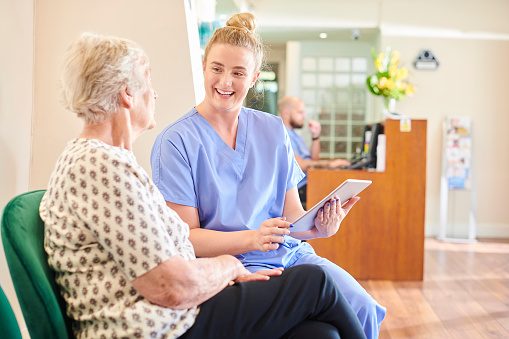Sussex Premier Health, Hastings: Important update for patients with upcoming appointments
Sussex Premier Health, Hastings: Important update for patients with upcoming appointments
A procedure that allows doctors to view difficult to see gut problems.

A barium swallow can help diagnose problems with the back of your mouth and throat (pharynx) and your gullet (oesophagus) using a special X-ray.
It involves taking X-ray images of your stomach and oesophagus after you’ve drunk a harmless liquid metal called barium contrast. The barium coats your stomach and oesophagus, so they show up clearly on the X-ray image. This allows a doctor or radiologist to see a detailed outline of these digestive organs and diagnose any problems.
It is also known as a barium X-ray or barium meal.
You will need a referral letter from a consultant or GP before booking any diagnostic investigation. You will have a formal consultation with a healthcare professional.
During this time, you will be able to explain your medical history symptoms and raise any concerns that you might have. We will also discuss with you whether any further diagnostic tests such as scans or blood tests are needed. Any additional costs will be discussed before further tests are carried out.
A formal consultation may not always be required for all patients.

One of our experienced and caring staff will ask you to drink a white liquid containing barium in an X-ray room. Its fruit flavoured and you’ll need to sip it rather than gulp it. This liquid will coat the lining of your oesophagus and stomach, allowing these structures to be captured more clearly on X-ray images.
As you swallow mouthfuls of this liquid, a series of X-ray images or continuous real-time X-ray images (fluoroscopy) will be captured of the barium, contrast passing down your throat and into your oesophagus. These images will be stored so your doctor can review them later.
You might also be given a muscle relaxant injection to prevent the stomach moving while the images are taken.
Next, the procedure will be repeated but instead of drinking a thick barium contrast liquid, you will drink a thinner version.

Once all the X-ray images needed have been taken, you can change back into your normal clothes and go home. You can immediately return to your usual activities, including eating and drinking, unless your doctor advises against it.
You may feel bloated for a few hours and it’s likely you’ll be constipated for a few days. Talk to your pharmacist about a mild laxative. Drink plenty of water and eat high fibre foods such as fresh fruit and veg, rice and wholemeal pasta to get things moving.
Many of us are affected by debilitating and painful digestion problems. Yet doctors find it difficult to examine the gut (the oesophagus and stomach) because it is difficult to get detailed images of this part of the body on X-rays. By covering it with barium a soft white reactive metal that is safe to consume, clinicians can get much better X-ray images and identify problems.
Your doctor may recommend a barium swallow to investigate the cause of symptoms such as:
A referral letter from a consultant or GP is required before booking any diagnostic investigation.
You should not take this test if you’re pregnant, as it exposes you to a low level of radiation. You start the procedure by consuming barium, and it usually lasts around 20 minutes. With a barium meal, images will be taken of your stomach while a barium, swallow and meal allow the clinicians to take pictures of your oesophagus as well.
We pride ourselves on our clinical excellence you’ll be looked after by an experienced multi-disciplinary care team.
Our patients are at the heart of what we do, and we want you to be in control of your care. To us that means you can choose the consultant you want to see and when you want. They’ll be with you every step of the way.
All of our consultants are of the highest calibre and benefit from working in our modern well-equipped hospitals. Our consultants have high standards to meet, often holding specialist NHS posts and delivering expertise in complex sub-specialty surgeries.
Many of our consultants have international reputations for their research in their specialised field.
We’ve tried to make your experience with us as easy and relaxed as possible. For more information on visiting hours, our food, what to pack if you’re staying with us, parking and all those other important practicalities, please visit our patient information pages.
Our dedicated team will also give you tailored advice to follow in the run up to your visit. Talk to your doctor about whether you need to adapt any medication you are taking before the procedure.
Never stop taking prescribed medicines without talking to a doctor.
Speak to a member of our team